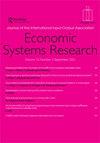Consumer preferences in CGE models when data are scarce: comparing the linear expenditure and the indirect addilog systems
IF 1.6
4区 经济学
Q2 ECONOMICS
引用次数: 1
Abstract
The linear expenditure system (LES) is a popular option for modeling consumer preferences in computable general equilibrium (CGE) models when data are scarce, since its underlying functional form is parsimonious in parameters. The goal of this paper is to compare the performance of LES against the indirect addilog system (IAS), a hardly known alternative, in terms of their theoretical properties and in a case study. Both systems are equally easy to implement and require the same information for parameter calibration. IAS, however, offers a richer description of consumer preferences. On the basis of an expenditure survey of Statistics Palestine in 1998, we find overwhelming statistical evidence that the IAS demand equations perform better than those of the LES. Simulations with a CGE model developed for disaster impact analysis applied to the intifada of the early 2000s show that the absolute value of the equivalent variation is larger for IAS than for LES.数据稀缺时CGE模型中的消费者偏好:比较线性支出和间接附加系统
当数据稀缺时,线性支出系统(LES)是在可计算一般均衡(CGE)模型中建模消费者偏好的一种流行选择,因为其基本函数形式在参数上是简约的。本文的目的是比较LES与间接加法系统(IAS)的性能,后者是一种鲜为人知的替代方案,根据其理论性质和案例研究。这两个系统同样易于实现,并且需要相同的参数校准信息。然而,IAS对消费者偏好提供了更丰富的描述。根据巴勒斯坦统计局1998年的一项支出调查,我们发现压倒性的统计证据表明,IAS需求方程的表现优于LES。应用于2000年代初起义的灾害影响分析的CGE模型进行的模拟表明,IAS的等效变化的绝对值大于LES。
本文章由计算机程序翻译,如有差异,请以英文原文为准。
求助全文
约1分钟内获得全文
求助全文
来源期刊

Economic Systems Research
ECONOMICS-
CiteScore
5.60
自引率
4.00%
发文量
17
期刊介绍:
Economic Systems Research is a double blind peer-reviewed scientific journal dedicated to the furtherance of theoretical and factual knowledge about economic systems, structures and processes, and their change through time and space, at the subnational, national and international level. The journal contains sensible, matter-of-fact tools and data for modelling, policy analysis, planning and decision making in large economic environments. It promotes understanding in economic thinking and between theoretical schools of East and West, North and South.
 求助内容:
求助内容: 应助结果提醒方式:
应助结果提醒方式:


